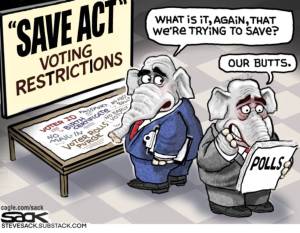Comment: Anti-vax culture war on mRNA may end up costing lives
Published 1:30 am Thursday, March 20, 2025
By Lisa Jarvis / Bloomberg Opinion
U.S. health agency leadership and policymakers seem intent on undermining trust in mRNA, the technology that saved millions of lives during the covid pandemic and has shown promise in addressing a range of infectious diseases and even cancer.
One troubling sign of the trend came when, according to KFF reporting, National Institutes of Health officials told academic researchers to remove any mention of mRNA vaccine technology from their grant applications. The directive dovetails with weak or misleading messaging from public health agencies on the value of vaccines and proposed state legislation that would ban mRNA shots.
All of this is sending public health in the wrong direction, whether because people eschew today’s covid vaccine or refuse to take whatever mRNA shots are developed to address a future pandemic; if those vaccines are developed at all. The current environment puts at risk momentum for critical prevention and treatments.
“What this is doing is quite literally putting partisan politics in front of a cure for cancer,” says Matthew Motta, an assistant professor of health law, policy and management at Boston University’s School of Public Health. “It’s really sad that this is going to impact people’s lives in a very tangible way, not only by taking away care that they have access to but deprive them of something they could have access to one day.”
The mRNA technology took decades to develop. It was painstaking work supported by NIH and ultimately recognized with the 2023 Nobel Prize in medicine. The goal is no different than that of a conventional vaccine; to expose the immune system to key components of a bad actor, whether a virus or a cancer mutation, so it learns how to shut it down the next time it appears.
Here’s what an mRNA vaccine does not do: integrate into or interact with our DNA, cause infertility, contain microchips or cause people to “shed” the vaccine.
And yet those claims have persisted; and not just from random people pushing conspiracy theories on social media. Government officials have also pushed the false theories. A 2021 analysis by the Center for Countering Digital Hate identified Department of Health and Human Services Secretary Robert F. Kennedy Jr. as one of the most prominent spreaders of disinformation about the covid vaccine. Kennedy lobbied to get the vaccine pulled from the market in mid-2021 and later called it “the deadliest vaccine ever made.”
He has not publicly repeated his wilder claims about covid vaccines since President Trump appointed him to the HHS job. However, he did question their use in children during his Senate confirmation hearings, and the agencies he oversees are signaling a distrust in mRNA. In addition to the potential cuts to funding supporting research on mRNA, NIH separately terminated dozens of grants related to studying vaccine hesitancy, some of which centered on the covid vaccines. HHS, meanwhile, is weighing pulling a $590 million contract awarded to Moderna to use its technology to develop bird flu shots.
Defunding or de-emphasizing research into mRNA and related vaccine hesitancy is deeply concerning. The suppression of scientific inquiry into an area of study that has already saved millions of lives and has the potential to be one of our best defenses against future pandemics puts all of us in harm’s way. This means we might be unable to pivot quickly to technology that can be rapidly deployed in an emergency. We also could be stifling research that could make mRNA better. Our covid vaccines do a great job of keeping people out of the hospital and from dying, but we should continue to look for shots that prevent infection or are more potent or can be made more cheaply. And, of course, the early promise the technology has shown in cancer is enough, as I’ve written, to warrant a full-court press.
Biotech firms like Moderna and BioNTech might take on some of the work, but academic partners funded by the NIH have been critical to the foundational science underpinning those companies’ work.
The scarier scenario is that we might find ourselves in an increasingly dangerous feedback loop around mRNA and vaccination, where distrust fomented by health agencies breeds anti-vaccine laws reinforcing that distrust. “If some people think vaccines are unsafe and ought not to be mandated, then our policymakers who are concerned about being reelected … have an incentive to follow through on it,” Motta says.
And, as Motta’s research has shown, they already are. Since Trump took office, multiple states have introduced legislation — some defeated, some pending — targeting mRNA vaccines. Policymakers in Idaho, Iowa and Montana attempted to ban mRNA vaccines altogether (the measure in Montana ultimately failed). Florida Gov. Ron DeSantis said this month he would seek to ban mRNA vaccine mandates permanently.
All of these actions by state and federal leaders don’t just set up barriers but feed mistrust around mRNA that could affect attitudes about the safety and value of all shots, whether for covid, bird flu or other diseases. That’s sending science backward and will ultimately be harmful to the American public.
Lisa Jarvis is a Bloomberg Opinion columnist covering biotech, health care and the pharmaceutical industry. Previously, she was executive editor of Chemical & Engineering News. ©2025 Bloomberg L.P., bloomberg.com/opinion.


